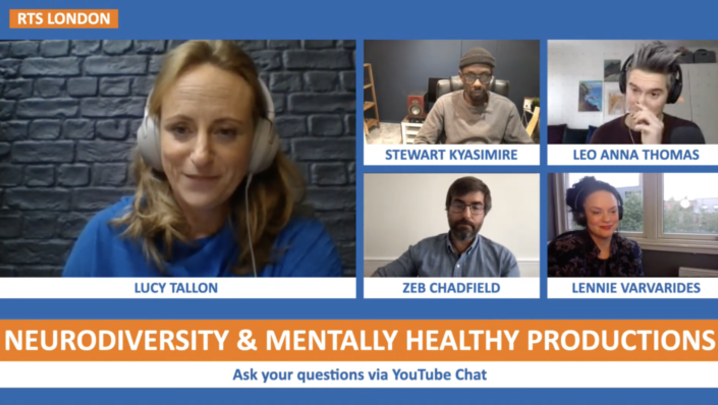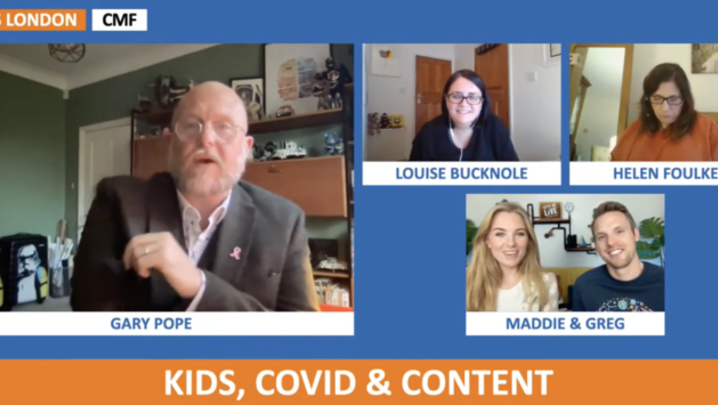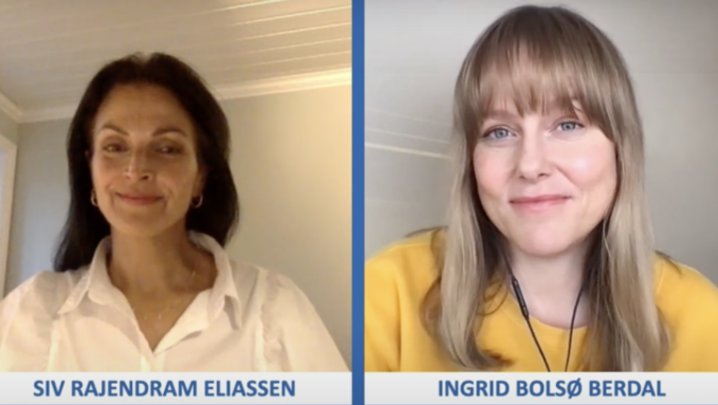KEVIN MACLELLAN: Thank you very much, Baz, and thank you for all the help you gave me this year putting the conference together. Baz gave me a great deal of advice during the course of the year, being an American and the first time doing this. He also gave me a bit of advice that made me quite nervous. At one point he said "Kevin, in England you have to make speeches funny", and I don't really know how to do conference funny. I do after a bottle of wine funny or best man's speech funny, maybe, basically anything inappropriate funny. So just lower your expectations on if you would on the funny quotient of the speech today.
As Baz said my name is Kevin MacLellan and I am the Chairman of Global Distribution and International, for NBCUniversal. So despite my very American sounding title I'm based right here in London where we have over 1,500 UK employees and we manage 36 offices around the world from here, at central St Giles. The UK is critical to the overall growth of NBCUniversal, with over 20 per cent of our international revenues generated here. Our TV production business has grown 600 per cent alone and we have invested over £500 million in the TV and film business in the last three years in the UK.
We are incredibly proud to be a member of such a thriving, talented and globally respected community. That's why as a long time admirer of RTS I was particularly honoured to be invited to chair this year's advisory committee.
In an effort to address current trends our theme this year is: “Full Stream Ahead; Commissioning, Producing and Distributing Content in the Age of On‑demand.” We aim to examine burgeoning new models of TV consumption and assess the exciting opportunities and, yes, the potential pitfalls that may exist in this new era of television.
I think we can all agree that the sea change we've been talking about for so long is now here. But it wasn't really the sea change that we were talking about that made me choose this topic today. It was in fact something much more personal. It was the birth of my sons. About 16 months ago my husband and I had twin boys, William and Alexander, and as is the case with most new parents we received in the mail a number of gifts from friends and family. Amongst the toys we got for the boys were a toy iPad, a toy Smartphone and my favourite, a toy television remote control. The reason this is my favourite is not because I'm a television guy, but really because the whole concept of trying to indoctrinate three‑month old to 18‑month old children into watching television seems somewhat ingenious and insidious to me at the same time.
But mostly why I love this little toy was because of what happens when you press play on the front, so just have a listen ...
(audio played).
1-2-3-4-5,
So many fun channels to watch LIVE!
6-7-8-9
So many to watch, so little time!
(...Applause...)
Three‑months to 18 months is what it said on the package and what I love most about what it says is that it prompts you to watch live. So I am really sure this was the brainchild of one of our colleagues in linear television, absolutely.
Anyway it got me thinking that despite the many tools at our disposal is it really possible to influence people of any age to continue watching linear television? Have the wheels of innovation already set in motion a chain reaction that will fundamentally change the basic tenets of consumption and storytelling forever? Or will our human need for shared experiences prevail? It's a big question and luckily not my job to answer today. I will however set the stage for our speakers by looking at the instigators of change and tracking the ripple effects that impact consumers, the platforms, the networks, the content creators, the economics behind the whole business and finally the regulatory bodies underpinning the entire industry.
I see technology as the great instigator of media. It is the pebble disturbing the surface of the pond. Decades of technological developments have enabled new ages of media. More recently the mainstreaming of broadband penetration has been a major agent. 86 per cent of the UK households now have fixed access. In 5 years UK Smartphone ownership has grown from 18 per cent to 67 per cent and what has emerged from this connectivity is the application of TV everywhere. Two way communication with audiences has led to advanced methods of search and discovery, news and review, video serving, data collection and programmatic ad targeting.
The expectations of on‑demand present exciting new challenges for content creators.
The establishment of a massive connected audience is a boon for those who's business benefit from two way engagement with the audience but it's also a potential threat to those whose businesses have traditionally depended on influencing, and let's be honest, to some extent controlling consumer behaviour.
Technology may be the great instigator of change but consumer behaviour is most certainly the accelerator of change. Whether consumers embrace or reject new products or programs is the key to their success. The question is to what extent can we influence consumers' behaviour in an on‑demand world? How many of you will turn on your television and look for a program using your EPG tonight? I'm gonna guess that it's a lot less than it would've been three years ago. On the other hand how many of you will watch a program based on an algorithm that has suggested it for you? I am going to guess that is a lot more than it was a few years ago.
So maybe the forms of the influence have changed but our ability to influence consumer behaviour has simply evolved. Yes, the consumer is more in control but with an avalanche of content we have the ability to be the pathfinders to guide that behaviour.
This shifting consumer behaviour has necessitated a fundamental change in the business models and platforms and networks, globally. Fixed line players are focusing on triple play and quad play and satellite operators are focusing on exclusive and original content.
Online platforms are morphing into virtual MVPDs. Broadcast networks respond with more originals, more sports, more news, more live entertainment, frankly more everything. But have these changes resulted in any positive momentum? Essentially daily average TV viewing over the past 5 years is down 9 per cent in the US and 11 per cent in the UK with significantly higher declines in younger audiences. Not great news. However, overall viewing of video has risen 12 per cent when you cume TV and online viewing over that same period. Back out user generated content and the total decline in professional content viewing is just 4 per cent.
Not ideal but not the disaster you might be led to believe.
After all how many pure play TV companies do you know today? Almost all major television businesses have diversified in one way or another into content creation and/or online distribution. Just look at ITV with ITV Hub and ITV studios or Comcast and NBCUniversal coming together. Look, it is not easy for large incumbent TV businesses to maintain pace with startups who are not necessarily interested in making a profit.
But anyone who has tried to launch a new online business will tell you great content and scale are key ingredients to success. With the recent consolidation of many platforms and networks it's clear the incumbents have scale. The question is: can they continue to provide great content at the speed the audiences want?
There is no doubt that content creators have benefited most from these rapid changes. Producers and artists have seen a massive increase in commissions for shows. For example the number of original scripted series on US television has almost doubled in the last 5 years. This increase in demand, particularly in English language content, combined with some strategically timed tax incentives ‑‑ thank you Mr Osbourne ‑‑ has resulted in the largest increase in UK TV production ever. This boost has benefited many creative executives in this market, the rapid consolidation amongst independent production companies has resulted in large payouts for relatively small companies. We've also seen significant shifts in consumer tastes as a result of on‑demand viewing. Shorter, more bingeable, edgier, more promotable, more serialised programs are all the rage at the moment.
The days of 22 episode procedurals and light‑hearted sitcoms filling the airwaves may be behind us. Viewers expect, no, they demand higher quality and ultimately more expensive shows.
This is perhaps the most challenging aspect of the new reality. Increased choice has resulted in increased expectation. So we as an industry need to figure out how to pay for all this new higher quality programming. It's ironic that developing funding models for our new reality comes so late in the process of change. But it's a result of the pace at which our industry has changed. If we had refused to respond to consumer demand for more high quality content because we couldn't get our spreadsheets to balance out we would most certainly have gone the way of the music industry. It's because we responded to the consumer demands that we've still got an industry to talk about. Clearly advertisers continue to see TV advertising as fundamental to their overall campaigns.
Last year CPTs in the UK grew 7 per cent and this year the US ad sales upfronts resulted in an average 10 per cent increase in CPTs across broadcast networks.
I'm certainly not claiming our current models are not threatened. I just don't see them collapsing as quickly as one might believe. There is still much to be done to accurately track viewing behaviour and advertising impacts in the new world of On‑demand.
Meanwhile, as an industry we must evolve funding models to include new streams of revenue like subscription, sponsored programming and micro‑transactions to fuel continued growth. I think we'll successfully meet these challenges that is if the numerous regulatory bodies governing our markets allow us to.
Underpinning everything we do is the complex framework or regulation, legislation and policy. Numerous regulators such as Ofcom, the FCC and the EU frequently make decisions that impact our ability to grow as an industry. In the past year alone we have seen major policy issues, such as the BBC charter renewal and the EU's digital single market initiative take centre stage. These debates have highlighted the many ways in which regulators can promote, or suppress, our industry. And no one can ignore June's EU referendum. Many people in our industry were left wondering just how Brexit will impact them. I'm looking forward to the chief executive of Ofcom, Sharon White, and the Minister of State, Matthew Hancock, shedding light on these important regulatory issues later today.
So as you can see from the slide behind me the instigators of change are many, and every change creates a ripple effect on every part of the ecosystem. It's easy to get lost in the complexity of it all. Just keeping track of these changes and the knock on effects is extremely challenging. Never mind creating or adjusting one's strategy to accommodate them. But I think the key to success is maintaining our focus on three primary growth drivers: creativity, innovation and execution. It may sound oversimplified but these three components are what have created every successful television program, network, platform app or online site in the world.
So some may lean further into innovation and execution, like Amazon, and others lean further into creativity, like HBO, but every successful entertainment business needs to balance all three of these components to succeed. Just ask Netflix who decided to invest $5 billion a year into creativity, despite the fact that they had an incredibly innovative platform and they executed its expansion quite brilliantly. Which is why I am so excited about our line-up of speakers today. Today's guests have all demonstrated exceptional mastery of these attributes. I hope you enjoy these sessions as much as I have enjoyed working with the talented advisory committee to put them together.









